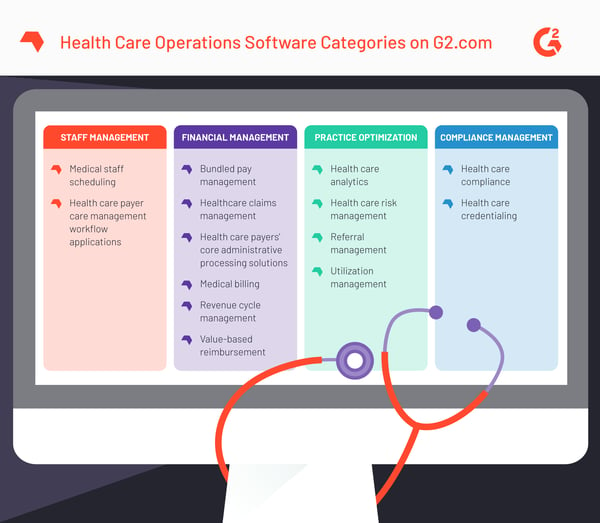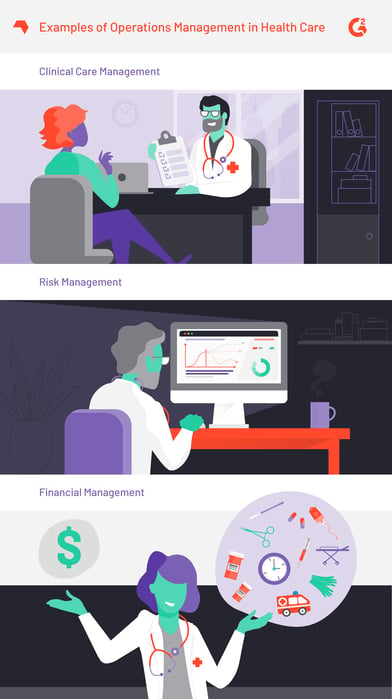March 22, 2019
 by Jasmine Lee / March 22, 2019
by Jasmine Lee / March 22, 2019

Optimizing operations management is necessary for any organization in any industry.
“Operations management” concerns the planning and organizing of the administrative, financial and operational processes of a company to better direct and utilize internal resources.
In the health care industry, people’s lives are at stake. Effective health care operations management goes beyond improving productivity and earning more money. Health care operations strategies and software facilitate the efficient provision and delivery of health care services to patients and communities to ultimately save and improve lives.
Both the health care industry and healthcare software are incredibly diverse in terms of provision of care and communities served, which makes health care operations management a beast unto itself. Proper operations management is vital.
Operations management refers to organizing a business to optimally utilize its resources, with the end goal to create efficiency, specifically, the highest possible level of efficiency. Operations management solutions and strategies focus on analyzing and improving business processes and practices. Operations management can be deployed in any industry because the process starts with analyzing the internal processes and roadblocks that exist within a specific company.
The products or services that a company offers impact the way it should conduct operations management.
In health care practices and facilities, operations management is responsible for facility oversight, staff functionality and delivery of the best care possible.
Health care operations include the administrative, financial and legal activities of a hospital, specialty practice, ancillary care provider or remote health service center. Health care professionals need to get a handle on operations because, at minimum, they enable running the business.
Some examples of health care operations include patient case management, coordination of care within and without a practice, financial management, and medical practice human resources.
On G2 Crowd, software categories existing under the health care operations software umbrella include:

As you can see, the patient case management software, overall patient experience software and clinical communication and collaboration software categories aren’t yet on the list. This is to help streamline the buyer’s research experience — the “health care operations” category includes only the solutions that streamline workflows, ease back-and-forth interaction between facility and third-party providers, or automate daily responsibilities.
Lest we forget the Health Insurance Portability and Accountability Act (HIPPA) and its indelible role in anything medical, let’s briefly discuss the role it plays in the consideration, deployment and implementation of health care operations software.
HIPAA established the rules, expectations and framework that determined the appropriate and legal storage and dissemination of private, personal health information. After HIPAA was passed in 1996, its effect was felt across the entire health care spectrum. Most of the time, the patient had the authority to specify which provider could use their health information and which aspects could be disclosed. I say “most of the time” because HIPAA didn’t apply in scenarios when prohibiting access to personal health information would result in a negative delivery of care. The act listed such scenarios, which aligned with some necessary health care operations.
Health care operations takes a variety of forms. As mentioned above, health care operations spans the spectrum of administration to care delivery. Below are example areas that benefit from operations management.

“Operational excellence” is a term that comes up when you talk about effective and efficient health care operations.
Health care providers are devoting more time and resources toward improving clinical operations. When operational excellence is chased, businesses see financial benefits and increases in staff productivity. Clinical operational excellence generally starts at the top (for instance, with demands from stakeholders), but depends on the mindset and behaviors of staff at every organizational level.
Operational excellence leads health care organizations to reach and sustain competitive advantage within their industry. By creating and maintaining operational excellence, medical staff are primed to productively respond to sudden changes in administration without compromising their organization’s end goals. At the end of the day, clinical excellence directly translates to providing patients with a comprehensive and satisfying experience.
When practices, hospitals and clinics achieve operational excellence, any change in process can result in increased operational efficiency, reduction of clinical variability and maintained or even improved care quality. That means facilities and medical professionals can keep up with industry and technological trends, ensuring modernized practices that can provide the best care for patients, regardless of diagnosis, medical needs or the availability of clinical services.
Innovation of health care technology drives industry trends that require evolving and adapting of set health care processes, protocols, regulation and strategies. Health care operations management is an area that undergoes change whenever patient and industry expectations change.
No matter what health care operations software your facility chooses to implement, it will help you address and resolve inefficiencies that are preventing your medical staff from doing what they are trained to do: care for the patient.
What administrative, financial, or organizational solutions have you implemented in your health care practice?
Myriad health care software exist that can help your clinic, practice, or hospital run at its most optimal and efficient. Head to our healthcare software category to check out alternatives to the current tools you utilize.
Jasmine is a former Senior Market Research Analyst at G2. Prior to G2, she worked in the nonprofit sector and contributed to a handful of online entertainment and pop culture publications.
Can data save lives? It can, and it is saving lives. If you are wondering how healthcare data...
 by Ilan Hertz
by Ilan Hertz
Health data is the lifeblood of the medical industry.
 by Jasmine Lee
by Jasmine Lee
Do you know the current health of your compliance program?
 by Lauren Pope
by Lauren Pope
Can data save lives? It can, and it is saving lives. If you are wondering how healthcare data...
 by Ilan Hertz
by Ilan Hertz
Health data is the lifeblood of the medical industry.
 by Jasmine Lee
by Jasmine Lee


